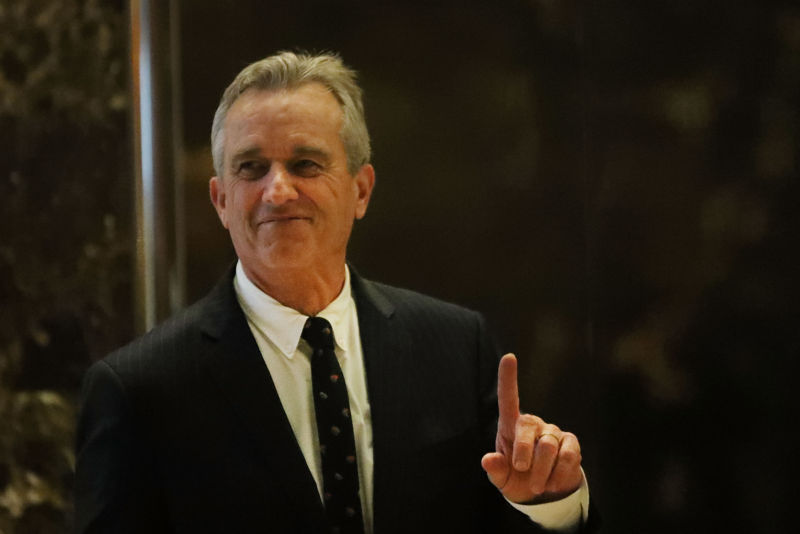words have meanings —
Facebook’s former biggest anti-vax advertiser is back with a new tactic.
Kate Cox
–

Enlarge / Robert F. Kennedy Jr., heads up to a meeting at Trump Tower on January 10, 2017 in New York City.
A notorious anti-vaccine group spearheaded by Robert F. Kennedy Jr. filed suit today in federal court in California alleging that Facebook’s fact-checking program for false scientific or medical misinformation violates its constitutional rights.
Children’s Health Defense claims in its suit (PDF) that Facebook, its CEO Mark Zuckerberg, and the organizations Science Feedback, Poynter, and PolitiFact acted “jointly or in concert with federal government agencies” to infringe on CHD’s First and Fifth Amendment rights. The suit also alleges Facebook and the fact-checking organizations colluded to commit wire fraud by “clearing the field” of anti-vaccine ads.
Facebook has “insidious conflicts with the pharmaceutical industry and its captive health agencies,” CHD claimed in a press release. “Facebook currently censors Children’s Health Defense’s page, targeting its purge against factual information about vaccines, 5G and public health agencies.”
“This is an important First Amendment case testing the boundaries of government authority to openly censor unwanted critiques of government policies and pharmaceutical and telecom products on privately owned internet platforms,” Kennedy added in a written statement.
Facebook’s biggest anti-vaxxer
Kennedy, through CHD and an affiliated group called the World Mercury Project, was responsible for more than half of anti-vaccine advertisements on Facebook when they were permitted, researchers found last year. That ended in 2019 amid a measles outbreak, when Facebook updated its policies following pressure from the Centers for Disease Control and lawmakers.
Ads touting false claims about vaccines were banned, and pages and groups that promote vaccine misinformation or hoaxes have their content deprecated in search and recommendations. Posts about vaccines may also be subject to Facebook’s fact-checking process and potentially have a link appended to lead readers to informative sites such as the World Health Organization.
Facebook’s fact-checking actions both violate CHD’s rights and also are defamatory, the group alleges. The organization’s reputation “depends on the credibility of its science-based research articles,” CHD writes in the suit, “which explore both the known and presently-unknown public health risks of vaccines and 5G and wireless technology.”
Essentially, the 115-page complaint argues that Facebook’s actions amount to censorship and defamation because CHD doesn’t like having its content called out as misinformation.
Facebook “integrated WHO and CDC definitions of ‘vaccine hoax’ into the algorithms and machine learning by which they have identified CHD’s content, which is often flagged merely because it is critical of those same agencies as ‘biased,’ ‘unreliable,’ and ‘out-of-date,'” the suit complains, adding that Facebook and the fact-checkers colluded “to label [CHD’s content] ‘False’ when it is critical of vaccine or 5G network safety, accomplishing this censorship through the sham machinations of ‘content moderators’ and ‘independent fact-checkers.'”
Working as intended
These actions “have already injured” CHD, the suit claims, “and will have the effect of further injuring [CHD] by damaging its trade reputation and goodwill, and those of [its] authors, diverting traffic from its site, and further curtailing its revenue and donations.”
If Facebook’s actions did indeed deprecate CHD’s anti-vaccine content and divert attention away, as the suit alleges, then its systems are working exactly as intended. But CHD cited a strong ally in its suit against those systems: the White House.
In May, President Donald Trump signed an executive order on “preventing online censorship.” That order, while arguably utterly unenforceable, calls on regulators to prevent social media firms, including Facebook, from working “to stifle viewpoints with which they disagree.”
There’s only so much one can “disagree” with facts; the Earth remains round (and its climate is changing) whether or not you believe it is. Historically, however, Facebook has had a very hard time walking that line and separating “fact” from “opinion” in its fact-checking process—particularly when someone with an audience cries “bias.”
In July, for example, reporters found that Facebook categorized climate change denialism, based on false claims, as “opinion” and exempted it from the fact-check process even though staff agreed it was partly false.
CHD in the suit argued that its anti-vaccine content should also be treated as opinion much as climate-change denialism is. “By using Facebook’s pre-populated options to mislabel [CHD’s] articles and videos, Science Feedback and Facebook intentionally tell the public that Plaintiff is presenting false information, when they know that the information presented is, at most, opinion and not false fact,” CHD claimed.

